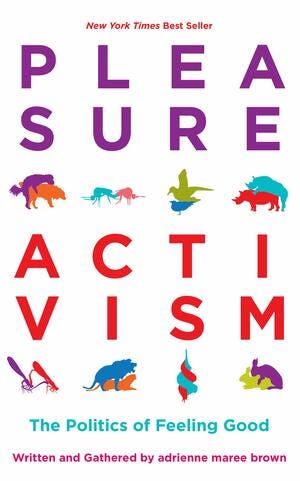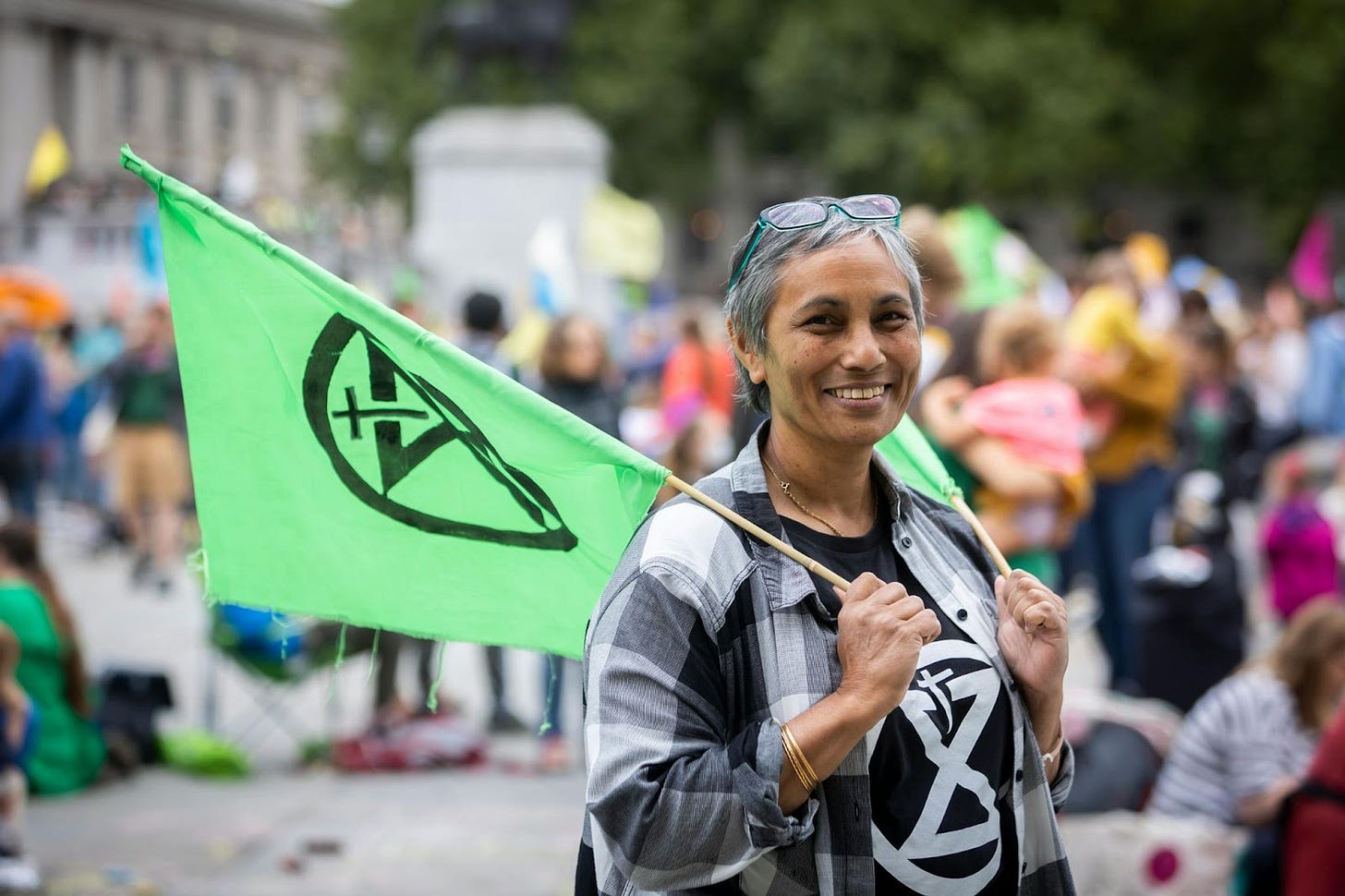Let Joy Guide You: The Power of Fun in Change Work
Explore the Role of Laughter, Creativity, and Connection in Community Organizing
Photo by Rawpixel.com via Shutterstock
Social change work is often characterized by its intensity, whether it involves organizing protests, building mutual aid networks, or dismantling oppressive systems. The enormity of the challenges can weigh heavily, leading many to associate activism with sacrifice and struggle. However, joy—a deep, abiding sense of fulfillment, connection, and vitality—can and should be a central element of this work.
Joy is not a frivolous distraction from the “real” work of social change; it’s a vital force that strengthens movements, fosters resilience, and builds solidarity. This article explores how joy has played a pivotal role in historical and contemporary activism, from Saul Alinsky’s strategic insights to the revolutionary frameworks of adrienne maree brown and Audre Lorde. Together, these thinkers remind us that joy is both a necessary antidote to burnout and a transformative power that reclaims our humanity in the face of dehumanizing systems.
Pleasure Activism: The Politics of Feeling Good
Cover of adrienne maree brown’s “Pleasure Activism” via StoryGraph
Adrienne maree brown’s Pleasure Activism provides a powerful framework for reclaiming joy as an act of resistance. Brown argues that pleasure is a vital tool in both personal healing and collective transformation. She writes, “What you pay attention to grows.” By embracing pleasure—whether it’s through art, dance, or community—activists nourish themselves and build more effective, sustainable movements.
In Pleasure Activism, brown explores how pleasure connects us to our most authentic selves and each other, cultivating movements that prioritize healing and joy. She invites us to rethink the traditional narratives of struggle and sacrifice, advocating instead for a politics of joy and abundance. In this light, pleasure isn’t an escape from the world’s troubles; it’s a radical act of transformation. By focusing on what brings us joy, we build the foundation for a world that is not only just but also vibrant, connected, and thriving.
Audre Lorde’s The Cancer Journals
Cover of Audre Lorde’s “The Cancer Journals” via Wikimedia
Audre Lorde’s work is another cornerstone of joy and self-preservation within change work. In The Cancer Journals, Lorde writes about her battle with cancer not just as a personal struggle but as an act of resistance to the oppressive forces of invisibility, marginalization, and illness in society. Lorde’s focus on self-care as an essential act of political resistance invites us to understand that joy—whether in survival, art, or relationships—is an essential radical practice.
In a time where communities face oppressive conditions that can lead to burnout and despair, Lorde’s reflections on care, creativity, and joy provide a balm for weary souls. In Lorde’s words, “When we are silent about our pain, we transfer that pain to those who will listen." Lorde encourages us to vocalize our joys, victories, and the small moments of lightness that fuel us, finding in them the strength to keep moving forward.
Radical Rules to Consider
Cover of Saul Alinsky’s “Rules For Radicals” via Wikimedia
In his seminal book Rules for Radicals, Saul D. Alinsky offers a set of guidelines for effective community organizing. Among his insights is Rule #6: “A good tactic is one your people enjoy.” This deceptively simple statement carries immense weight. Alinsky understood that joy isn’t just a byproduct of activism—it’s a critical element of sustaining movements. If people find fulfillment, laughter, and camaraderie in their shared efforts, they’re more likely to stay engaged, innovative, and resilient.
Joy doesn’t diminish the seriousness of social change work; it enhances it. When strategies are enjoyable, they become inherently sustainable. Organizing a community garden, hosting a teach-in with music and food, or marching alongside friends while chanting and singing transforms the grind of activism into something life-affirming. The work becomes the reward, even as it seeks broader systemic change.
Resist With Joy
Photo by Joko Narimo from Pixabay
History is full of examples where joy served as a form of resistance. During the Civil Rights Movement, activists often sang songs like We Shall Overcome, not only to inspire courage but also to find solace and strength together. Similarly, in the Zapatista movement, celebrations of Indigenous culture—complete with food, music, and dance—helped unite communities against oppression. Joy in these contexts wasn’t escapism; it was revolutionary.
Even in individual acts of defiance, joy can be found. Think of the humor and creativity in protest signs or the small victories celebrated within mutual aid networks. These moments of lightness are far from trivial. They’re acts of reclaiming humanity in the face of dehumanizing systems.
Why It Matters
Photo by Centre for Ageing Better via Pexels
Sustainability: Movements fueled by joy are inherently more sustainable. Burnout is a real threat in activism, but joy replenishes energy and keeps people committed for the long haul.
Community Building: Joy fosters connection. It’s easier to build solidarity and trust when people share laughter and uplifting experiences.
Strategic Power: Joy disrupts the narrative that activism is drudgery. It attracts new participants, shifts public perception, and reminds people that a better world is possible and worth fighting for.
Practical Ways to Cultivate Joy in Movements
Photo by Library of Congress on Unsplash
Celebrate Victories: No matter how small, every win deserves recognition. Take time to acknowledge progress and share successes.
Integrate Creativity: Bring art, music, and storytelling into your work. Creativity fuels the spirit and makes gatherings more engaging.
Create Space for Fun: Organize events purely for enjoyment as well, like potlucks, picnics, or game nights. Building relationships outside of the work strengthens the work itself.
Practice Gratitude: Regularly reflect on the privilege of being part of something bigger than yourself. Gratitude can transform frustration into fulfillment.
Joy as the Compass
Photo by MasterTux from Pixabay
Social change work is inherently challenging, but it doesn't have to be joyless. Joy acts as a compass, pointing us toward the actions and strategies that resonate with our values and build genuine connections. From Saul Alinsky’s Rules for Radicals to adrienne maree brown’s Pleasure Activism and Audre Lorde’s reflections on self-preservation, joy emerges as a powerful tool for sustaining movements, nurturing creativity, and fostering community.
When we center joy in our work, we invite more people to join us, not out of obligation but from the shared belief that a better world is not only possible but already taking root. Whether singing together at a rally, sharing food at a community event, or creating art that envisions liberation, joy strengthens our resolve and deepens our relationships.
In the words of adrienne maree brown, “What you pay attention to grows.” By paying attention to joy, we create movements that are not just about resisting oppression but about building lives and communities worth living in. Let joy guide you, energize you, and remind you that the fight for justice is also a celebration of life.
Beyond Darwinism - Mutual Aid Index
Beyond Survival of the Fittest: Kropotkin's Vision of Mutual Aid
What is the role of solidarity and reciprocity in building equitable and sustainable communities?
Mutual Aid Among Plants and Animals: Cooperating for Survival
Peter Kropotkin Observes How Cooperation Among Species Improves Survival and Shapes Evolution.
Frolics and Barn-Raisings: Mutual Aid Amongst the Amish
Take a Look at the Amish Traditions of Collective Action and Solidarity.
The Arab Spring: Mutual Aid in the Fight for Freedom
See Solidarity in Action with the Collective Struggle for Liberation in the Arab Spring Movements.
The Black Panther Party’s Legacy of Community Empowerment Through Mutual Aid
The BPP protected and served their communities despite rampant racism and being the main targets of the FBI’s Counter-Intelligence Program.
Blessing Boxes: Mutual Aid in Our Communities Today
Find Out How These Simple Free Community Pantries Transform Neighborhoods and Promote Solidarity.
Childcare Collectives: A Modern Expression of Mutual Aid
Childcare Collectives develop when families, friends, and neighbors pool their resources to raise children.
Feeding Hope: The Impact of Community Fridges as Mutual Aid
See How Grassroots Efforts Like Chattanooga’s Hope Community Fridge Transforms Food Access and Fights Food Apartheid.
Grow Food Together: The Impact of Community Gardening as Mutual Aid
Shared Gardens Enhance Food Security, Build Community Bonds, and Promote Well-being Without Personal Expense.
Community Self-Defense: Protecting Ourselves and One Another
Let’s Talk About How Communities Work Together to Protect Themselves From Harm Inflicted by the State and Fascists.
Community Workspaces: Where Coworking Meets Opportunity
Find Out How Shared Community Workspaces Support Creativity and Mutual Empowerment.
Deciding Together: The Consensus Model in Mutual Aid
How Collective Decision-Making Builds Strong and Resilient Movements As Shown by Occupy Wall Street.
Live Together, Thrive Together: Shared Housing as Mutual Aid
Imagine Housing as a Way to Build Community and Share Resources.
Breaking Bread, Building Bonds: What’s Cooking in Community Kitchens?
Learn How These Shared Kitchens Create Lasting Change Through Healthy Meals, Cooking Education, and Mutual Aid.
Migration and Mutual Aid: Navigating a Climate Crisis Together
The USA and Global North Grew Rich Burning Fossil Fuels. Radical Cooperation Can Help Us Adapt to a Changing World.
Forgive Us Our Debts: How Debt Collective Helps Abolish Financial Servitude
Debt Collective Branched Off From Occupy Wall Street and Unifies Debtors in Mutual Aid for Collective Liberation.
Thou Doth Protest? How The Diggers Reclaimed the Commons and Fought Early Capitalism
Learn About the Radical Solidarity and Resistance to the Enclosure of the Common Lands in 17th-Century England.
A World Without Barriers: Consider Accessibility in Mutual Aid
Everyone Becomes Disabled if They Are Lucky. So How Can We Make Our World More Accessible?
Mutual Aid in the Eye of the Storm: Disaster Relief Amid Climate Change
When Disaster Strikes, Mutual Aid Responds: A Blueprint for Resilience Amid More Frequent Catastrophes
Beyond the Ballot Box: Build Dual Power for Real Change
Empower People Through Mutual Aid, Solidarity, and Community Control.
Communities of Care: How Solidarity Transforms Support for Elders and the Differently-Abled
How Can Mutual Aid Principles Change Elderly and Disabled Care From Isolation to Connection?
Growing Resistance: How Food Forests Feed Communities for Free and Defy Capitalism
From Commodities to Commons: The Radical Potential of Agroforestry
Roots of Resilience: Black Mutual Aid Societies in American History
Explore W.E.B. Du Bois’ Work and the Heritage of Solidarity Among Black Folk.
From Despair to Dignity: The Radical Work of Free Clinics
How Mutual Aid and Community Solidarity Transform Access to Healthcare
Feeding Each Other: The Radical Power of Free Grocery Stores
How This Kind of Mutual Aid Transforms Hunger Relief into Community Empowerment
Challenge Capitalism One Free Store at a Time
How Free Stores Empower Communities and Challenge Scarcity
The Past & Future of Self-Governance: How General Assemblies Build Dual Power
Strengthen Communities Through Direct Democracy and Mutual Aid
Let Joy Guide You: The Power of Fun in Change Work
Explore the Role of Laughter, Creativity, and Connection in Community Organizing
Fascism Unmasked: How to Recognize and Resist Modern Authoritarianism
Empower Your Resistance: A Practical Guide to Revolutionary Optimism, Mutual Aid, and Defying Totalitarians
Resist Burnout: Care, Coping, and Wellness in Dark Times
How can we practice self-care to endure the revolutionary marathon and better support one another?
Resistance Anthems: Protest Music for Hard Times
Let’s Unite Our Voices For Justice Through the Power of Music!
Affinity Groups: Decentralized Resistance in an Age of Crises
How Do Small, Autonomous Collectives Build Power and Resistance Against Fascism, Capitalism, and Collapse?
Share a Feast: How Potlucks Build Community and Connection
Let’s Discuss How Sharing Food Nourishes Both Bodies and Bonds Across Generations.
Notes From the Underground: How Forests Teach Mutual Aid
How Do Fungi, Trees, and Other Plants Thrive Through Cooperation and Reciprocity?
Fight Book Bans with Little Free Libraries
How Do Little Free Libraries Turn the Tide Against Book Bans and Censorship?
Read, Rest, Revolt, Repeat: Study Groups as Mutual Aid
How Does Collective Study Build Power, Sharpen Strategy, and Sustain Movements?
Burn After Reading: Comms Discipline for Mutual Aid and Resistance
Think About Encryption, VPNs, Walkie-Talkies, and the Lost Art of Keeping Your Mouth Shut.












Such a timely message and so needed today. You put so much into this beautiful article JM! I especially loved your section about the need to create space for joy. Great job!